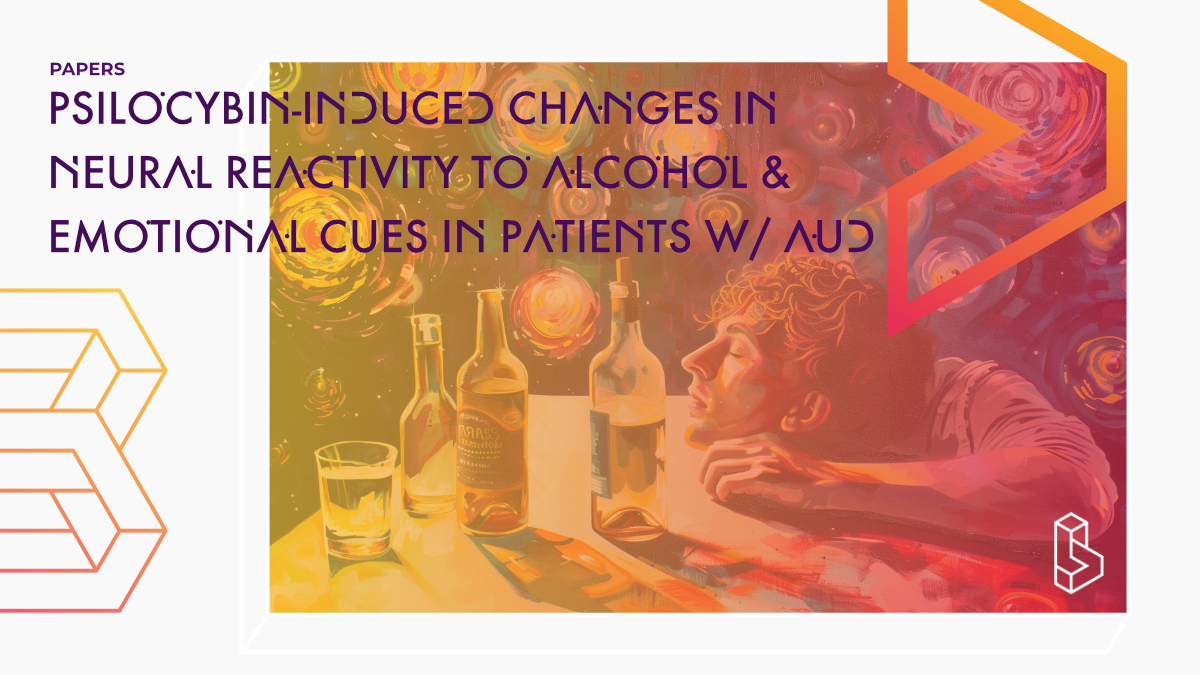This reanalysis of a Phase II study (n=11) investigated psilocybin-induced changes in neural reactivity to alcohol and emotional cues in patients with alcohol use disorder (AUD). Participants received psilocybin (25mg; n=5) or diphenhydramine (antihistamine; 50mg; n=6). Psilocybin increased activity in the medial and lateral prefrontal cortex and left caudate, while decreasing activity in several other brain regions. These findings suggest enhanced goal-directed action, improved emotional regulation, and diminished craving.
Abstract of Psilocybin-induced changes in neural reactivity to alcohol and emotional cues in patients with alcohol use disorder: an fMRI pilot study
“This pilot study investigated psilocybin-induced changes in neural reactivity to alcohol and emotional cues in patients with alcohol use disorder (AUD). Participants were recruited from a phase II, randomized, double-blind, placebo-controlled clinical trial investigating psilocybin-assisted therapy (PAT) for the treatment of AUD (NCT02061293). Eleven adult patients completed task-based blood oxygen dependent functional magnetic resonance imaging (fMRI) approximately 3 days before and 2 days after receiving 25 mg of psilocybin (n = 5) or 50 mg of diphenhydramine (n = 6). Visual alcohol and emotionally valanced (positive, negative, or neutral) stimuli were presented in block design. Across both alcohol and emotional cues, psilocybin increased activity in the medial and lateral prefrontal cortex (PFC) and left caudate, and decreased activity in the insular, motor, temporal, parietal, and occipital cortices, and cerebellum. Unique to negative cues, psilocybin increased supramarginal gyrus activity; unique to positive cues, psilocybin increased right hippocampus activity and decreased left hippocampus activity. Greater PFC and caudate engagement and concomitant insula, motor, and cerebellar disengagement suggests enhanced goal-directed action, improved emotional regulation, and diminished craving. The robust changes in brain activity observed in this pilot study warrant larger neuroimaging studies to elucidate neural mechanisms of PAT.”
Authors: Broc A. Pagni, Petros D. Petridis, Samantha K. Podrebarac, Jack Grinband, E. D. Claus & Michael P. Bogenschutz
Summary of Psilocybin-induced changes in neural reactivity to alcohol and emotional cues in patients with alcohol use disorder: an fMRI pilot study
Alcohol use disorder is characterized by an impaired ability to regulate or abstain from alcohol despite negative personal, occupational, and social consequences. A three-domain model has been proposed to account for the core neuropsychological features of AUD.
Although medications exist for AUD, the effect sizes are disappointingly small and limited to particular sub-populations. However, emerging evidence suggests that psilocybin, the psychoactive constituent of magic mushrooms, may precipitate sustained reductions in drinking behaviour after one or two drug administrations.
Psilocybin is a nonspecific serotonin agonist that profoundly alters sensory, emotional, and cognitive perception. It has been shown to have therapeutic potential for treating psychiatric conditions, including major depressive disorder, treatment-resistant depression, anxiety and depression in cancer patients, and smoking cessation.
Find this paper
https://doi.org/10.1038%2Fs41598-024-52967-8
Open Access | Google Scholar | Backup | 🕊
Cite this paper (APA)
Pagni, B. A., Petridis, P. D., Podrebarac, S. K., Grinband, J., Claus, E. D., & Bogenschutz, M. P. (2024). Psilocybin-induced changes in neural reactivity to alcohol and emotional cues in patients with alcohol use disorder: an fMRI pilot study. Scientific Reports, 14(1), 3159.
Study details
Compounds studied
Psilocybin
Topics studied
Alcohol Use Disorder
Addiction
Study characteristics
Original
Original Re-analysis
Placebo-Controlled
Active Placebo
Double-Blind
Participants
11
Humans
Institutes
Institutes associated with this publication
NYU Langone HealthThis company doesn't have a full profile yet, it is linked to a clinical trial.
Compound Details
The psychedelics given at which dose and how many times
Psilocybin 25 mg | 1xLinked Research Papers
Notable research papers that build on or are influenced by this paper
Multidimensional Personality Changes Following Psilocybin-Assisted Therapy in Patients With Alcohol Use Disorder: Results From a Double-Blind, Placebo-Controlled Clinical TrialThis reanalysis of a Phase II study (n=84) investigates the effects of psilocybin-assisted therapy (PAT) on personality traits in alcohol use disorder (AUD). Psilocybin (2x, 25-40mg/70kg; n=44) significantly reduced neuroticism and increased extraversion and openness compared to placebo (diphenhydramine, n=40). Decreased impulsiveness correlated with lower alcohol consumption post-treatment, suggesting PAT may normalize abnormal personality traits in AUD.
Percentage of Heavy Drinking Days Following Psilocybin-Assisted Psychotherapy vs Placebo in the Treatment of Adult Patients With Alcohol Use Disorder
This double-blind, active placebo-controlled study (n=95) finds that psilocybin (2x, 25-40mg/70kg) significantly reduced the number of heavy drinking days (10% versus 24% in the placebo group) in the 32-week follow-up period. The trial is the first to test psilocybin for alcoholism (alcohol use disorder, AUD) in a double-blind study.
Linked Clinical Trial
A Double-Blind Trial of Psilocybin-Assisted Treatment of Alcohol DependenceSeveral lines of evidence suggest that classic hallucinogens such as psilocybin can facilitate behaviour change in addictions such as alcohol dependence. The investigation is a multi-site, double-blind, active-controlled trial (n=95, 47 per group) contrasting the acute and persisting effects of psilocybin to those of diphenhydramine (placebo) in the context of outpatient alcoholism treatment.

